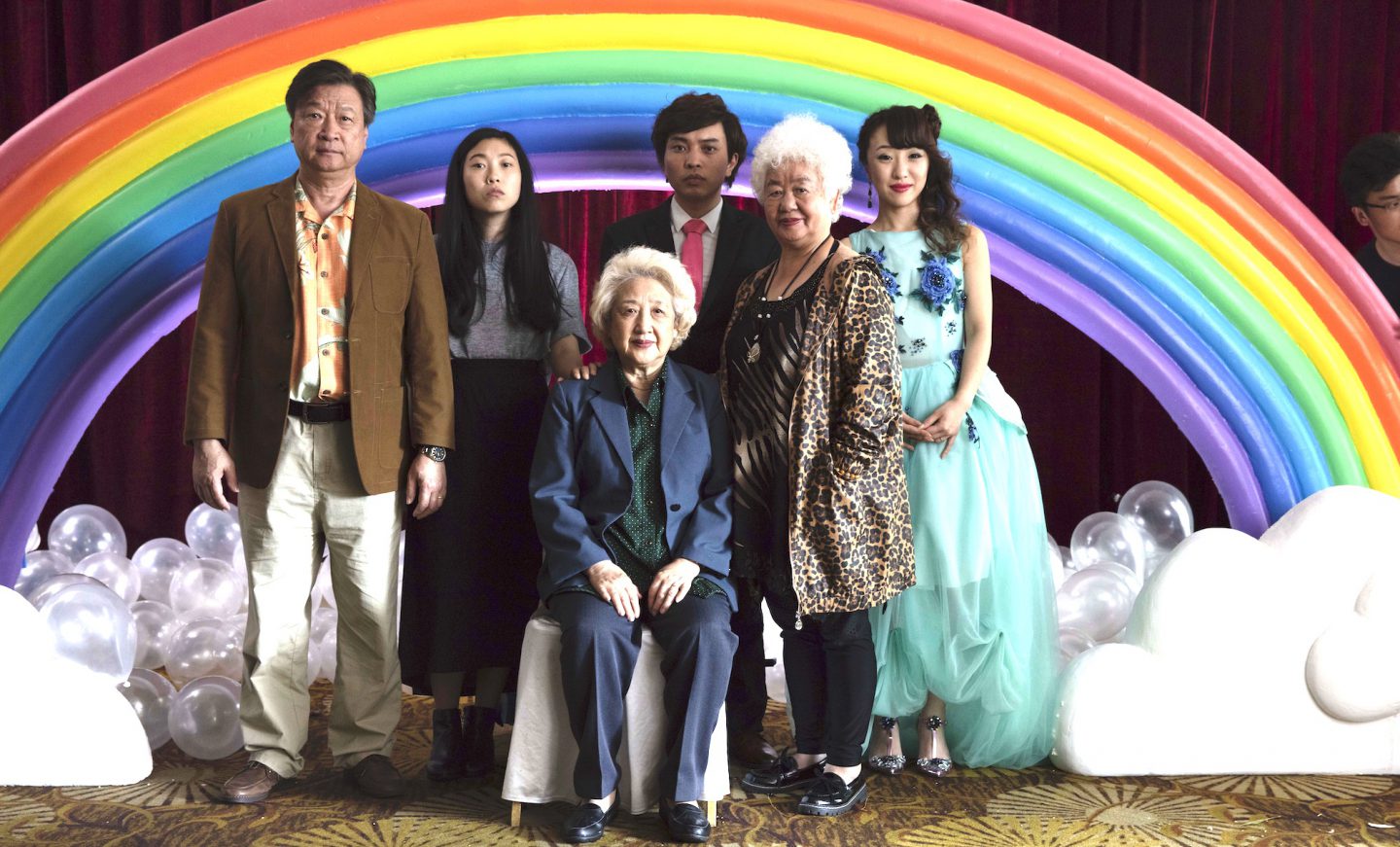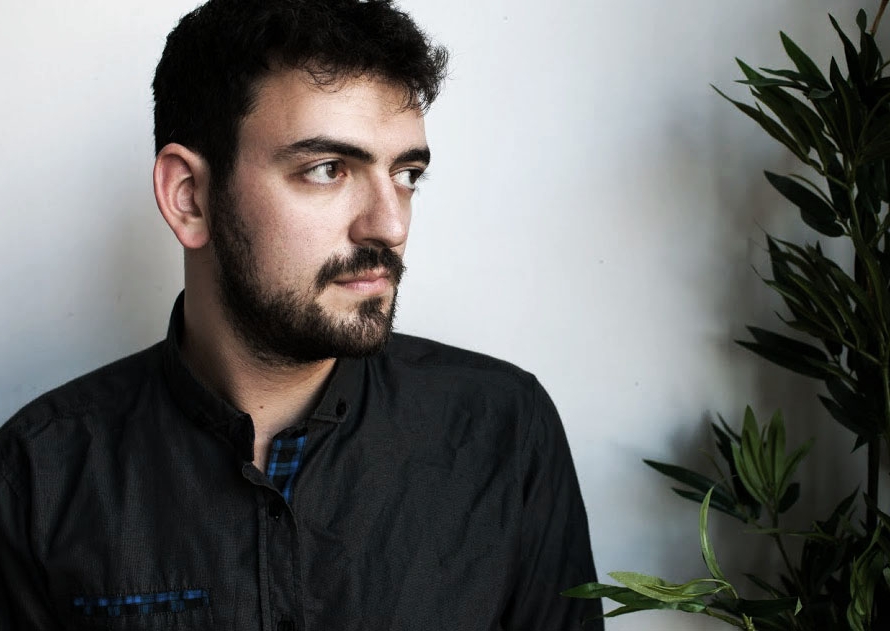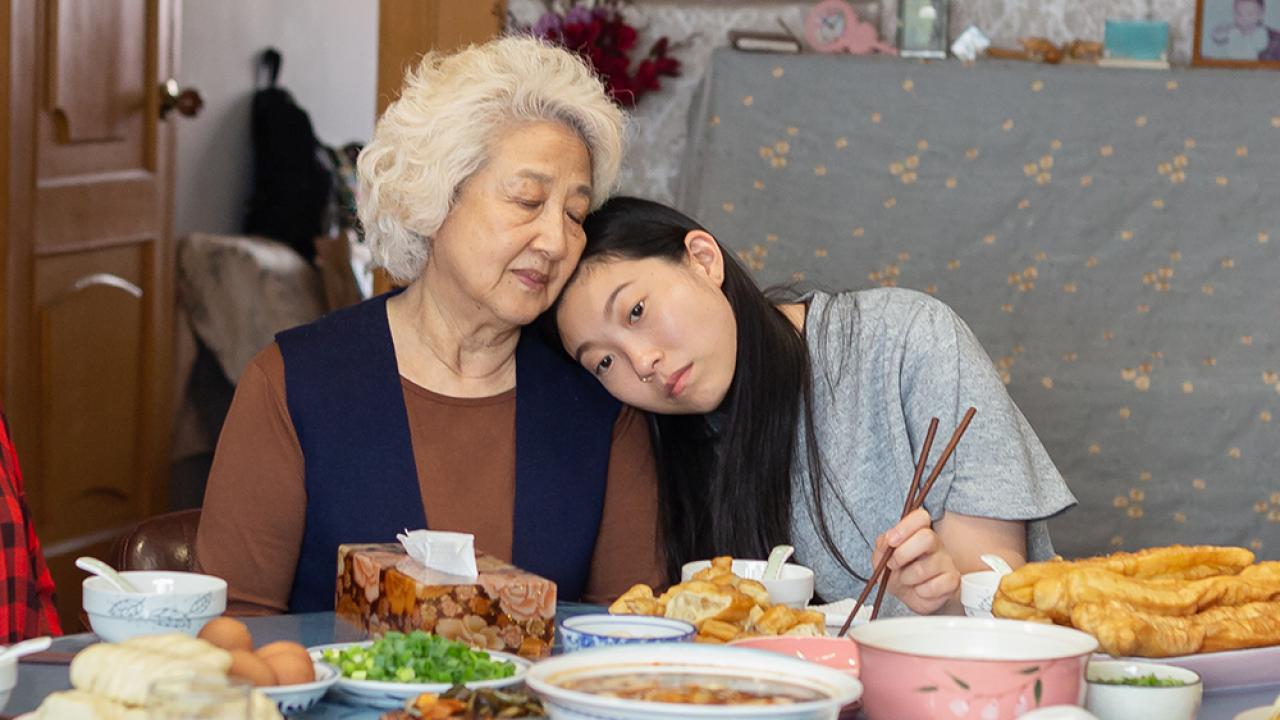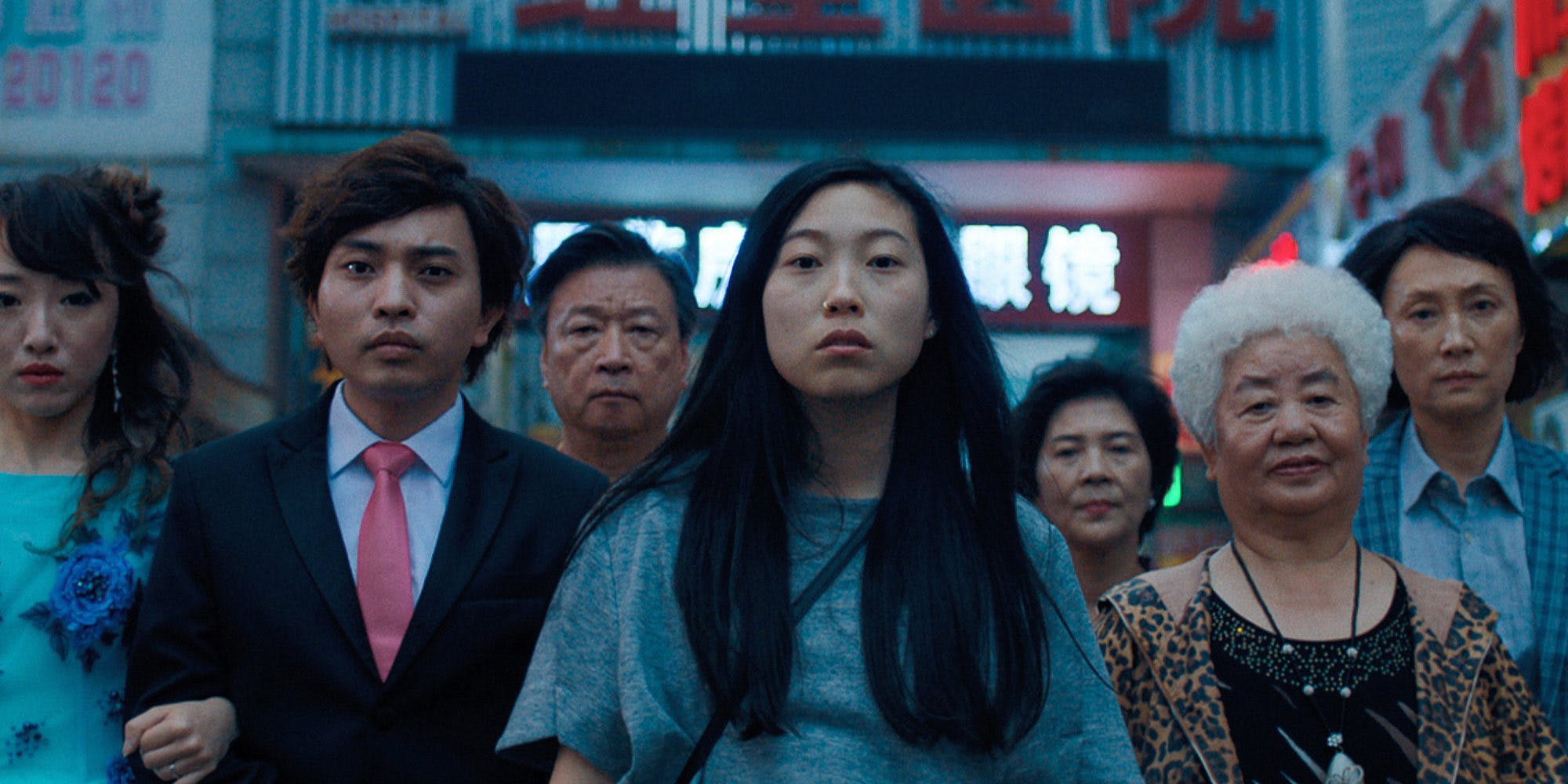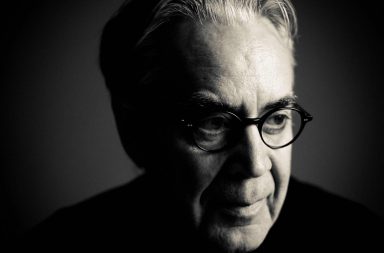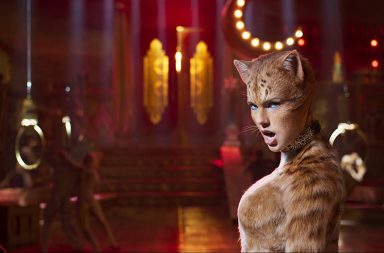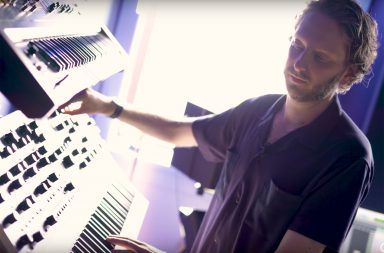Halfway through Lulu Wang’s latest feature film, The Farewell, there is a crucial moment: in the midst of a family argument, Billi, the main character, sits at a piano and aggressively slams the keys to play an intense, violent piece in which she expresses all her anger and frustration. It lasts just a few seconds, but the violence that bursts out from this moment is the film’s central point in which the filmmaker concentrates the very essence of her character and, to a larger extent, her film. Awkwafina, who has been freshly awarded with a Golden Globe for her interpretation of Billi (Lulu Wang’s alter ego), moves forward through the film in an emotional no man’s land between truth and deception, between her Chinese and American cultures, between the unity of her family and the inner struggles of her own.
The director, also a classically trained pianist, has a very precise idea of her film’s score, but the arrival of Alex Weston, a composer who has been Philip Glass’s assistant for many years and who splits his time between film music, art installations, performances and his own original compositions, changed a great deal of her original vision. Weston’s delicate, heartbreaking score explores, through the predominant use of voices and strings, the themes of loss, sadness and grief which the characters must muzzle in order to keep their lie alive. Our following interview with Alex Weston has been edited for length and clarity.
Score It Magazine: For starters, can you tell us a bit about your background and the path that led you to The Farewell?
Alex Weston: My early musical experience was as a pianist. I started doing classical music, then for a period of time I was very into jazz. I thought I was gonna become a jazz pianist. Weirdly, through improvisation, I found my way back to classical music, as a way to explore improvisation, as a way of composing, actually. So I went back to it more seriously. When I went to college, I studied composition at Carnegie Mellon University in Pittsburgh, and then graduated and came to New York to try to be a musician. Coming here, I started working pretty quickly with Philip Glass as an assistant, that’s how I learned a lot about scoring. I did a lot of short films and student films, zero-budget indies, stuff like that, and at the same time assisting Philip and other composers. Through all these strings of connection I ended up meeting [music supervisors on The Farewell] Sue Jacobs and Dylan Neely. They were looking at options for composers, so I wrote some pieces on spec to demo. And that’s pretty much how I got involved into this movie.
You assisted Philip Glass on his film scores as well, in addition to his own compositions?
Yeah. The last film we did was Jane, a documentary about Jane Goodall. Well, actually, sorry, there was another one after that, by Bernard Rose, who did Candyman. The movie was called Samurai Marathon, that was a small thing, we did a lot of re-recordings of some of Philip’s preexisting pieces. That’s the most recent one, but the one with only original score was Jane.
In order to test the waters, you provided music for two scenes. Which were they?
I think the thing that Lulu wanted to hear first was the scene when Awkwafina’s character is arriving in China, she’s in a taxi, on her way to the house. I did that one, and I did the very first scene, when Little Nai Nai decides she’s gonna lie. What’s kind of funny is, I scored these scenes and Lulu was interested in working together, and nothing I wrote for these scenes ended up in the movie! (Laughs.)
What direction did you initially take, then?
It took us a long time to really settle up on a direction and find the right tone, and Lulu had a very specific idea in mind, what she wanted was very ‘capital-C Classical’-sounding score. We didn’t want it to sound dated but we definitely wanted this to be rooted in Western classical music, but the original way I approached it was more like a more normal film score. My original theme for the beginning was much more ominous and sad, but we ended up doing something very simple and—I don’t know if this is the right term—‘saving face-like,’ like this feels emotional but it’s not supposed to be emotional, because that’s what the family is doing by lying.
Lulu Wang has a music background as a pianist. How much was she involved in the scoring process?
She was very, very, very much involved. (Laughs.) It was funny because sometimes, you work with a director and he or she has no musical background whatsoever, and you get notes that make no sense at all, like, ‘Could you just take out the saxophone, I hate the saxophone…’ And there’s no saxophone at all! (Laughs.) Whereas Lulu was so particular, she would come up to me and say, ‘Could you change that E to a D natural?’ But actually, it was great to work with someone whose notes actually make sense. That’s good!
Lulu is credited for the version of Giordani’s ‘Caro Mio Ben’ that’s in the film. Who had the idea to have her play the piano part?
We did a recording session with Hera Hyesang Park, who is the singer, and she brought an accompanist to the recording session. A few days later, Lulu was like, ‘This isn’t right, I have to do it!’ And she does a great job!
Despite Lulu’s very thorough suggestions, was there any room for improvisation in the making of the score?
For sure! Just like in any other film score, it takes a lot of starts and false starts to figure out the direction, because of course, the tone of the film is so particular. We wanted to sound classical but not dated, and it had to be not too emotional because they’re covering their emotions… It was a weird line to straddle. So there was a lot of back and forth and a lot of false starts to figure out where we were going.
Willingly or not, some aspects of the music look up to other contemporary classical composers like Philip Glass or David Lang. Which composers play a part in your creative process and inspiration?
Oh, my God, I love David Lang. Inevitably, Philip does because, obviously, we’ve been working together for so long, it’s seeped into my system (laughs). My favourite film composer of the recent years was Jóhann Jóhannsson. His protégée, Hildur [Guðnadóttir], has done such an amazing work last year, for Chernobyl and Joker. I’m also thinking of Nico Muhly—he also was Philip’s assistant a few people before me.
There’s this scene where Awkwafina plays the piano while all the family sits at a table behind her. The solo piece she plays—which isn’t featured in the album—is quite aggressive and expresses the character’s frustration and struggles. Did you write it?
Yes. Actually, that was a very particular problem in the score, because they shot the scene with Awkwafina playing along with a recording and they did it, I think, to a Brahms piece. And then, afterwards, we decided that this should be based on our ‘lie theme’. I said, ‘Okay, but we already have footage of Awkwafina playing,’ so that was me improvising something and then they edited it later so it could match her hands exactly, or at least as close as they could. And honestly, for that reason I didn’t really wanted it to be on the score: it’s very aggressive and it stops very abruptly, so it works in the scene but musically, by itself, I felt it was just scattered. Actually, since the movie came out, I’ve had some e-mails from people asking me, ‘Is there a sheet music of that part? Because I would like to play it.’ And I’d be like, ‘Nah… ‘cause I don’t think it’s playable!’ (Laughs.)
A thing that is very significant in your score is the use of vocals. There’s a choir, which is obviously the musical expression of the family, or the lie, and a soloist who sings a motif that we find in many cues, and who is Billi’s inner voice, singing her sadness and individuality towards the rest of her family. How did you get this curious idea of having voices in your score?
Voices were also something that Lulu had in mind from the beginning. Thinking about the music for the movie in the early stages, she had this idea of having only vocal arrangements of classical pieces, so at one point early on she wasn’t looking for a composer. It was only after we talked that we decided to do something original. Having a choir can seem so big and melodramatic, you know, and it plays kind of funny against how small and intimate the story actually is. At the end of the day, it’s a story about family and about something that happens in every family—grandparents die. It’s not a big deal but this family goes through it as the biggest deal. So the choir goes very melodramatic for something that, in the cosmic scheme of things, doesn’t matter so much. The soloist voice is a male singer—a lot of people think it’s a woman, but that’s another lie (laughs)—who sings a woman’s register. It’s a phenomenal singer named Mykal Kilgore—check out his stuff, he’s got a really, really incredible voice.
To be honest, working with voices is kind of tough. When you’re doing a normal film score, you’re doing strings. It’s a lot easier, whereas when you have a singer, you don’t just put your finger on the right spot. You have to listen and to internalize it, and you ask yourself questions like, ‘What kind of vowel do we need?’ It can be a ‘oh,’ a ‘ooh,’ it can be more rounded… That was the most stressful part of the job.
Well, actually, there was a more daunting thing than everything I just said, which was to get Lulu to approve the demo. I didn’t have the singers first, so for the vocals, I would use a really shitty keyboard choir sound, and I constantly kept saying to Lulu, ‘It’ll sound much better with the singers, trust me.’ And she just couldn’t picture it, so for the demos… I sang. I’m not a singer, so I used Auto-Tune very aggressively. I have recorded almost the whole score with me as the choir, layered like twelve times with a ton of Auto-Tune, and then I gave it to her, saying, ‘Please, don’t show anybody!’ (Laughs.) So, yeah, the demo version of this score is me with a ton of Auto-Tune and it should never see the light of day! (Laughs.)
At one point in the film, Billi’s uncle says to her that it’s the family that should bear the burden of death. That’s the moment when I understood that that is what the music was doing: while the film often plays on lighter notes, the music alone bears the burden of loss. Another way to see it is that the uncle is Lulu, telling you that the music has to keep the sadness at its core so the film can carry on with being funny.
That’s exactly how we were considering it. There’s also another line early in the movie that’s interesting, when Awkwafina’s character first finds out, she’s talking to her parents in the bedroom and they tell her, ‘Your Nai Nai’s dying.”The mum says, ‘Chinese people have a saying, “When you get cancer you die, but fear will kill you first.”’ When I was working on the movie and I watched it by myself, I found it so poignant, the crunch of the movie for me is made up in that sentence. Then I saw it at the theatre maybe three or four times—the Sundance premiere, our release party and then I went to see it with just a normal audience, with friends—and every time, people would laugh at the first half of the sentence and they’d miss the rest of it, and I would be like, ‘No, this is gonna explain the whole movie, don’t laugh right now!’
What can you tell us about Wander Darkly, which will premiere at the end of the month at Sundance?
I’ll be vague, but it’s a very different movie than The Farewell. The score is very electronic, much more textural in atmosphere. The movie stars Sienna Miller and Diego Luna as this very passive-aggressive couple, and there’s a traumatic event very early in the movie and the whole movie is the two of them going through memories of their relationship. It’s a little bit like Eternal Sunshine of the Spotless Mind, so they’re going into their memories and commenting it, it’s a pseudo-surreal kind of thing. It’s an interesting movie and I’m very excited for it to come out.
Interview prepared, conducted and transcribed by Valentin Maniglia. Edited by Marine Wong Kwok Chuen.
